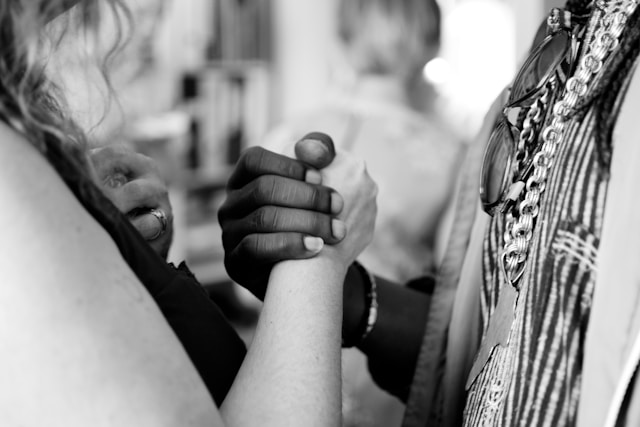Navigating TRAUMA and Finding Your Way Forward
Life has a way of throwing us into the deep end when we least expect it. Whether it's a health crisis, the loss of a loved one, or a major setback at work, we all face trauma that shakes us to our core and leave us questioning everything we thought we knew.
In the midst of these trials, it's easy to feel like we've lost our way, like we'll never find our way back to the light. But what if these dark nights of the soul are actually invitations to grow, to transform, to discover a strength and resilience we never knew we had?
In this post, we'll explore how our greatest challenges can become our greatest teachers, and how by changing the way we view and navigate these stormy seas, we can emerge with a clearer sense of purpose, a deeper appreciation for life, and a more authentic connection to ourselves and others.
Guiding Women to Reclaim Joy and Thrive
Irina Shehovsov is a beacon of transformation for women over forty seeking to heal from toxic relationships and step into their most joyful, purposeful lives. As the Founder of Reclaim Your Life, a 5-time #1 International Best-Selling Author, and a certified NLP, Time Line Therapy™, and Hypnotherapy Master Coach, Irina brings a wealth of expertise and heart to her holistic mentorship program, Happiness Academy.

But Irina's impact reaches far beyond her one-on-one work. Through her inspiring podcasts, Single Parent Success Stories and Reclaim Your Life with Irina, she's empowering listeners worldwide to embrace their stories, rediscover their worth, and fearlessly pursue their dreams.
The Stories We Tell Ourselves
Trauma Narratives That Shape Us
When we're in the thick of a difficult experience, it's not just the practical challenges that we're grappling with—it's also the stories we tell ourselves about what's happening and what it means about us. We might tell ourselves that we're being punished, that we're not strong enough to handle this, or that we'll never be happy again. These narratives, while understandable, can keep us stuck in a cycle of pain and hopelessness.

Rewriting the Script of Trauma
The good news is, we have the power to rewrite these stories. We can choose to see our challenges not as cruel twists of fate, but as opportunities for growth and self-discovery. Maybe losing your job is the universe's way of nudging you towards a career that aligns better with your passions and values. Maybe the end of a relationship is clearing the way for you to develop a deeper, more loving relationship with yourself.
Embracing the Hero's Journey
In many ways, navigating a major life crisis is like the hero's journey in myths and stories. The hero is going about their normal life when suddenly they're called to adventure, to leave the familiar and confront the unknown. Along the way, they face trials, setbacks, and their deepest fears. But through this process, they discover hidden strengths, allies, and wisdom that they bring back to transform their lives and their world.
When we can see our own struggles through this lens, as a challenging but ultimately transformative journey, it can give us the courage and perspective to keep moving forward.
The Power of Small Joys
Finding Light in the Darkness of Trauma
In the midst of trauma, it's easy for our world to narrow, for everything to feel heavy and dark. We might feel like we can't allow ourselves to experience joy or pleasure until all our problems are solved. But research shows that cultivating positive emotions, even in small doses, is crucial for building resilience and coping with stress. Moments of joy, laughter, beauty, and connection remind us that there's still goodness in the world, still reasons to keep going.
Reconnecting with Simple Pleasures
So what are the simple things that bring you joy and make you feel more like yourself? Is it losing yourself in a good book, taking a bubble bath, dancing around your living room, or having a heart-to-heart with a dear friend?
Make a list of these small pleasures and commit to incorporating them into your life, even (and especially) when you're going through a tough time. These aren't frivolous extras—they're essential nourishment for your soul.

Savoring the Good Despite Trauma
In addition to actively seeking out joyful experiences, we can also train ourselves to savor and appreciate the good that's already present in our lives. This might mean keeping a gratitude journal, where each day you write down a few things you're thankful for. It might mean taking a few minutes each day to really savor your morning coffee, feeling the warmth of the mug in your hands, smelling the rich aroma, tasting each sip.
By consciously directing our attention to the positive, we help counterbalance the brain's natural negativity bias and build our capacity for joy and resilience.
The Art of Self-Compassion
Self-compassion is the practice of treating ourselves with kindness and understanding, especially during moments of difficulty or failure. Often, we fall into the trap of harsh self-criticism, believing it will motivate us to improve. In reality, this approach only deepens feelings of inadequacy and makes it harder to move forward.
Instead, self-compassion invites us to respond to our struggles the way we would to a dear friend. This means acknowledging our pain without judgment, validating our emotions, and recognizing that imperfection is part of being human. It's not about avoiding accountability or dwelling on setbacks; it's about creating a foundation of support and care within ourselves.

By practicing self-compassion, we cultivate resilience and a healthier mindset. It enables us to approach challenges with greater clarity, rebuild confidence after setbacks, and grow through the lessons life offers. In embracing this skill, we learn to navigate life's ups and downs with grace and strength.
Growing Through tRAUMA
The Transformative Power of Acceptance
When we're in pain, our natural instinct is often to resist it, to fight against what we're feeling. We might try to numb our emotions with distractions or addictions, or get caught up in cycles of self-judgment and blame. But what if, instead of resisting our pain, we could learn to lean into it? What if we could bring a sense of openness and curiosity to our difficult emotions and experiences?
This is the essence of acceptance—not a passive resignation, but an active choice to meet reality as it is, without judgment. It's a way of saying, "This is what's happening right now, and even though it's hard, I can handle it".

Befriending Our Fears
Often beneath our trauma, there's a layer of fear. We might be afraid that we'll never recover from this loss, that we're not strong enough, or that we'll be alone forever. One of the most powerful things we can do is bring compassionate awareness to these fears. Instead of getting caught up in the stories they're spinning, we can learn to observe them with a sense of kind detachment, like clouds passing through the sky.
As we do this, we might find that our fears start to lose their grip on us. We might discover that we're more resilient than we realized, that we have the resources and support to weather this storm.

Finding Meaning and Purpose Beyond Trauma
Some of the most profound growth and transformation can happen when we're able to find meaning in our struggles, when we can connect our personal pain to a larger sense of purpose. This doesn't mean that our challenges happen "for a reason" or that we need to be grateful for our suffering. But it does mean looking for ways to channel our pain into something meaningful and life-affirming.
Maybe your experience with illness inspires you to advocate for better healthcare access. Perhaps the loss of a loved one deepens your commitment to living fully and loving openly. Maybe your own journey through grief and healing allows you to support others going through similar struggles.
When we can connect our own healing to a sense of purpose beyond ourselves, it can give us the motivation and resilience to keep going even when things are hard.
The Gifts of Vulnerability
The Courage to Be Seen
When we have experienced trauma, it can feel scary to open up and let others see our pain and struggles. We might worry about being judged, misunderstood, or seen as weak. But what if vulnerability is actually a hidden superpower? What if, by sharing our stories and our authentic feelings, we create space for deeper connection, support, and healing?

The Paradox of Vulnerability and Trauma
Here's the thing about vulnerability: it's scary because it involves risk. When we share our truth, we risk rejection, disapproval, or being emotionally hurt. But vulnerability is also the birthplace of love, belonging, joy, and connection. It's by risking vulnerability that we let others know that they're not alone in their own struggles and imperfections. It's how we invite more understanding, empathy, and genuine support into our lives.
Vulnerability as an Invitation to Heal Trauma
When we have the courage to be vulnerable, something amazing happens. We give others permission to do the same. By sharing our stories, we say "Me too. I know what it's like to struggle, to doubt, to feel lost. And I'm here with you." We start to create a world where it's okay to be human, to be imperfect, to need help sometimes.
And in turn, we invite more depth, authenticity, and connection into our relationships. We discover that our struggles, when shared, have the power to heal not just ourselves, but each other.
The TAKEAWAY
Navigating trauma and life's darkest moments is one of the most challenging and transformative experiences we can go through. It's not a journey we would ever choose, but it's one that can reveal depths of strength, wisdom, and beauty we never knew we had.

As you move through your own process of struggle and healing, remember to be patient and kind with yourself. Grief, growth, and transformation all have their own timeline - there's no "right" way to do this.
Keep reaching for the light, even if it's just one small glimmer at a time. Keep connected to your sources of joy, support, and meaning. And trust that even in the darkest of nights, dawn is on its way. You are the hero of your own story, and this difficult chapter is shaping you into the person you're meant to become. Keep going.


